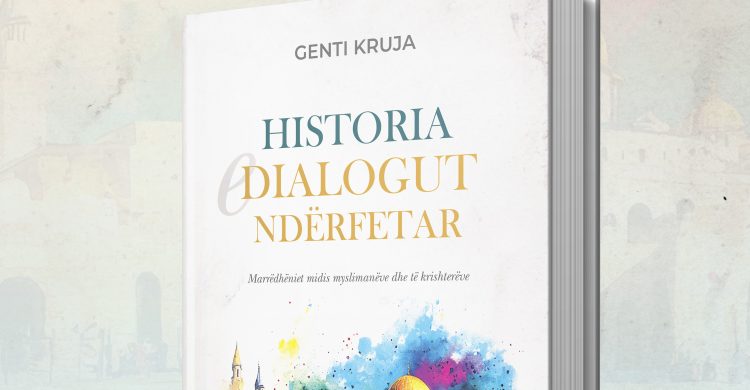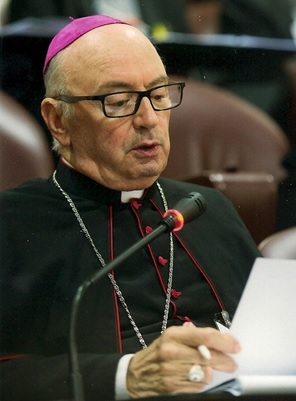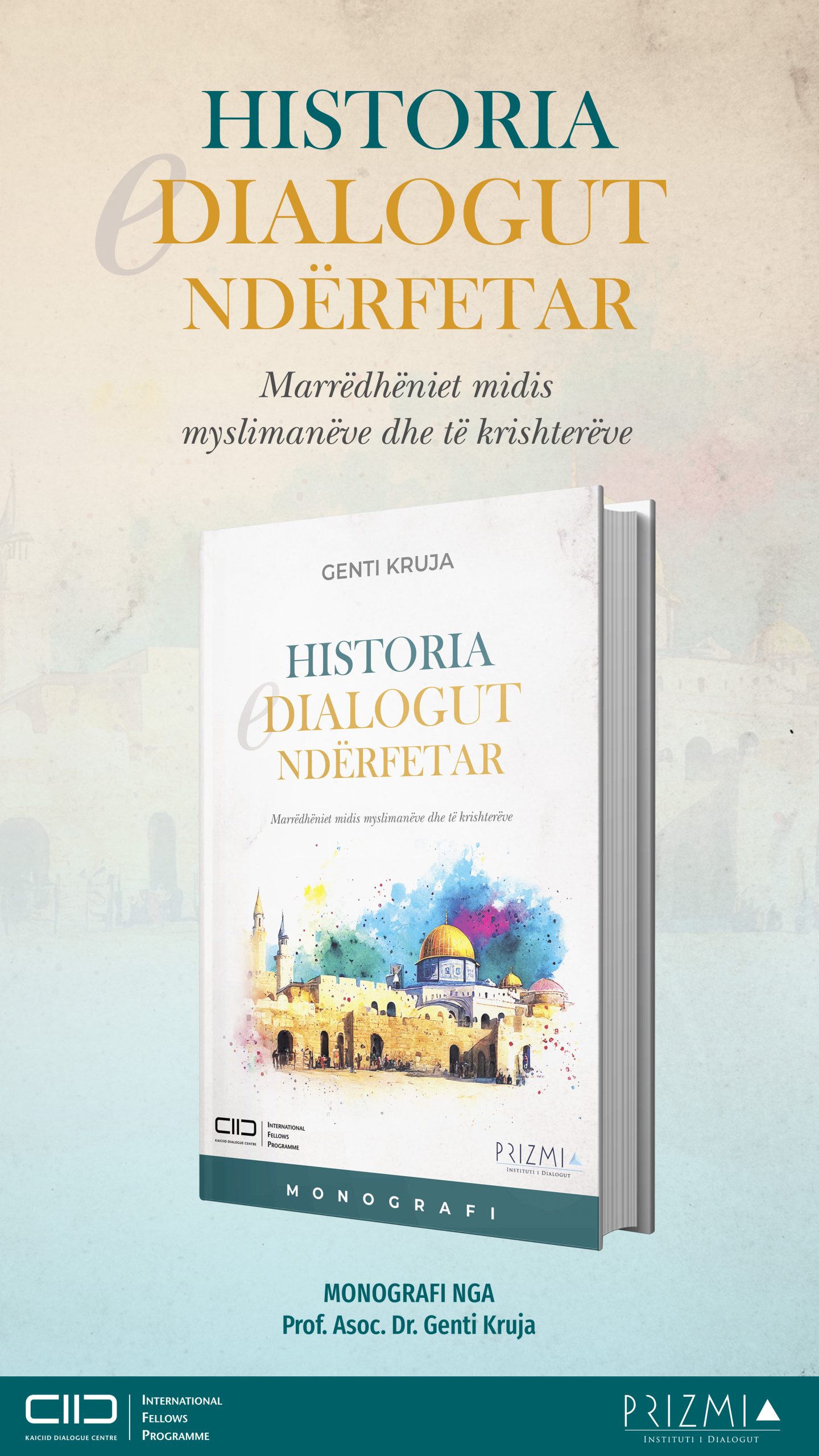

by Dr. Anthony George Frendo[1]
Ndihem shumë i nderuar se miku im Prof. Genti Kruja më ka kërkuar të shkruaj këtë parathënie për këtë libër shumë interesant, fryt i shumë hulumtimeve, që pasqyron shpirtin e hapur të mikut tim për dialogun ndërfetar. Në fakt, lexuesi sigurisht do të habitet duke shikuar sesi një profesor mysliman u referohet shumë dokumenteve të Kishës Katolike. Dhe ky fakt e bën punën e autorit më të besueshëm.
Në Hyrje, shkrimtari përmendi se, pas 11 shtatorit 2001 (shembja e kullave binjake në New York), kanë qenë disa të cilët, fatkeqësisht, e kanë klasifikuar Islamin, si një besim, që nxit terrorizëm. Si thotë autori, “asnjë fe nuk është bazuar kurrë në konfliktin… Në të kundërt, këto fe (Judaizmi, Krishterimi apo Islami) janë rreptësishtë kundër rrëmujës, tradhtisë, konfliktit dhe shtypjes”. Më 11 tetor 2001, në Bazilikën e Shën Gjon Lateran në Romë, Kardinali Ruini, Vikari i Papës, kryesoi një kremtim për të përkujtuar atë tragjedi të ndodhur një muaj më parë. Për këtë kremtim ishin të pranishëm përfaqësues të ndryshëm myslimanë dhe të krishterë. Në revistën që botohej në atë kohë Jeta e Kushtuar, kam shkruar: “Terroristët justifikojnë veprimet e tyre në emër të Allahut, duke bërë kështu një karikaturë të besimit Mysliman, që është krejt tjetër nga besimi që nxit luftën dhe urrejtjen”.
Përsëri në Hyrje, autori tregoi bindjen e tij se “Dialogu ndërfetar jo vetëm që është i dëshirueshëm, por është një proces i nevojshëm”. Janë fjalë që jehojnë, pothuaj fjalë për fjalë, fjalët e Papa Benediktit XVI para dhjetë viteve. Dhe autori vazhdon të tregojë se nuk bëhet fjalë për një sinkronizëm të besimeve. Në fakt, kur thotë (I.1.) se “hapi i parë në vendosjen e [dialogut ndërfetar] është largimi prej argumenteve polemizuese” (unë do të shtoja: “dhe nga çdo lloj proselitizmi”) dhe “theksimi i pikave të përbashkëta”, me fjalë të tjera thotë se: së pari duhet të kuptojmë dhe të pranojmë se jemi të ndryshëm, dhe le ta ruajmë identitetin tonë. Së dyti duhet të zbulojmë, të mbrojmë, të shpallim dhe të nxisim vlera të përbashkëta. Autori përmend disa vlera të përbashkëta për të cilat bota e sotme ka më shumë nevojë sot.
Me të drejtë autori pohon se “feja… është forcë thelbësore shpirtërore, që frymëzon miliona njerëz të së tashmes. Dhjetëvjeçarët e fundit të shekullit XX treguan një ringjallje fetare në shumë vende të botës, e dukshëm veçanërisht në shtetet e Evropës Lindore, përfshirë këtu edhe Ballkanin, pas rënies së komunizmit” (I.5.1.). Shpeshherë kam pasur rast të përmend rolin e veçantë të besimeve: misioni ynë nuk arrin t’i ndryshojmë strukturat e shoqërisë – ky është roli i politikës, roli ynë është t’i ndryshojmë zemrat – atje ku nuk mund të arrijë politika. Dhe më vonë shkrimtari jep disa shembuj konkretë, që tregojnë se vetëm besimet, sot, mund të shpallin dhe të mbrojnë vlerat morale në shoqëri: “Feja insiston në integritetin e martesës, mbi mëkatin e lidhjeve brenda së njëjtës gjini, mbi papranueshmërinë e ndërprerjes artificiale të jetës humane, qoftë abortimi, eutanazia, etj.” (po aty).
Një pikë që për mua ka një rëndësi të madhe për përgjegjësit e besimeve është fjala e autorit: “Fetë duhet të jenë të vëmendshme që të mos identifikohen me pushtetet politike, me qëllim që t’i kenë duart e lira për të punuar për drejtësinë dhe paqen” (I.3.). Krishti ka shprehur këtë mendim kur tha: “Jepni Cezarit çka i përket Cezarit, dhe jepni Perëndisë çka i përket Perëndisë” (Mk. 12, 17). Është shumë e lehtë, që një besim të manipulohet nga politikanët, ose që një besim të identifikohet me politikën. Por ja si besimi humb lirinë e vet. Por kur një besim mbron të varfrit dhe punëtorët, kur denoncon korrupsionin dhe padrejtësinë, kjo nuk është ndërhyrje në politikë, por ushtrim i misionit të tij në favor të drejtësisë dhe të paqes. Pra autori vazhdon, duke treguar të drejtat njerëzore, që duhet të shpallen dhe të mbrohen.
I kam gjetur shumë interesante ato pjesë, ku flitet për tolerancën ndërfetare në Islam me shumë citime nga Kur’ani (II.1.) dhe për të drejtën personale në zgjedhjen e besimit, “Ju keni fenë tuaj, unë kam fenë time” (II.2.). Më shumë shembuj të kësaj tolerance dhe bashkëjetese ndërfetare gjenden në pjesët e tjera të Kapitullit II. Jashtëzakonisht interesant është Kapitulli III, që ka si titull Marrëdhëniet Myslimano – të Krishtera gjatë historisë. Këta dy Kapituj më kanë ndihmuar shumë personalisht për të kuptuar sesi feja Islame ndikon për marrëdhënien harmonizuese ndërfetare. Kuptoj pra, pse miku im, H. Bujar Spahiu, menjëherë pasi u zgjodh Kryetari i Komunitetit Mysliman në Shqipëri, ka shprehur se, ndër prioritetet e tij në këtë detyrë, do të mbajë nxitjen e marrëdhënieve të mira ndërfetare. Por, si vetë katolik, më pëlqeu shumë të lexoj ato pjesë ku autori tregon, me shumë aftësi, se si janë rritur dhe forcuar marrëdhëniet mes katolikëve dhe myslimanëve pas Koncilit II të Vatikanit deri më sot. Më pëlqeu gjithashtu që autori i është referuar Thomas Michel-it, duke e quajtur “një shembull i dialogut”. Michel (prift jezuit, si Papa Françesku), i cili ka qenë në Shqipëri dhe ka dhënë një ligjëratë pikërisht mbi dialogun të krishtero-mysliman, është autor i shumë shkrimeve mbi besimin islam.
Në të gjithë librin më bëri shumë përshtypje sinqeriteti i autorit, veçanërisht atje ku flet për marrëdhëniet midis myslimanëve dhe të krishterëve. Autori shkruan: “Në konfirmimin e parimeve të përbashkëta të besimit, drejtësisë dhe pajtimit, palët e konflikteve lokale, ndihmohen që ta lirojnë Islamin dhe Krishterimin nga përgjegjësia e interpretimeve egoiste dhe interesave lokale” (III.11.). Dhe pastaj u referohet artikujve të botuar në vitin 1999, në revistën Dawn, në Pakistan, nga Ekbal Ahmed, i cili i trajtoi ashpër “shtrembërimet e Islamit nga absolutistët dhe tiranët e shteteve me shumicë myslimane, obsesioni i të cilëve për të rregulluar sjelljen personale, nxit “një rend islam të kthyer në një kod penal, të zhveshur nga humanizmi, estetika, kërkimet intelektuale dhe devotshmëria e tij shpirtërore”. Pa dyshim, të gjitha besimet kanë pasur në historitë e tyre disa faqe të zeza. Autori është shumë realist kur pohon se në të kaluarën, fetë kanë qenë “faktorë uniteti, por edhe përçarjeje” dhe “faktorë lirie, por edhe frenimi të lirive njerëzore” (III, 12.).
Veçanërisht sot nuk duhet të ketë vend për luftë mes feve, Islamit dhe Krishterimit. Lufta e përbashkët e sotme është me atë botë që, duke mohuar Zotin Krijues, po krijon zota dhe vlera të rreme, siç janë racizmi, pornografia, dhuna brenda familjes, përdhunimi seksual, droga, etj. Me të drejtë autori shkruan: “njohja e shenjtërisë së qenies njerëzore dhe respektimi i dinjitetit të saj, ndihmojnë në bashkëpunimin e bashkësive fetare me organizatat ndërkombëtare, që merren me çështjet e të drejtave njerëzore”. Por s’duhet të harrohet dimensioni vertikal i besimeve, sepse “njeriu ndodhet gjithnjë në marrëdhënie dhe është i hapur ndaj një dimension tjetër të realitetit, që do të mund të quhej i përtejshëm, i shenjtë, hyjnor” (III.12.2.).
Nën titullin “Qytetërimi Perëndimor dhe ai Islam” (III.13.) autori na kujton kontributin e madh të botës arabe, kulturës botërore. Më kujtohet kur, para shumë viteve, profesori i historisë se filozofisë na tregonte se si, në krahasim me zhvillimet e mëdha që bëheshin në botën arabe, Evropa e shekujve IX-XII ishte ende shumë mbrapa. Autori përmend veprat e Aristotelit, që ishte ende krejt i panjohur në Evropë, derisa erdhën dy teologët domenikanë Alberti i Madh dhe Thoma i Akuinit (madje, ky i fundit përdori gjithashtu filozofinë e myslimanëve al Farabi dhe Avicena).
Unë jam shumë dakord me mendimin e tij kur thotë:
“Mund të ndodhë që njerëzit të shfaqin frymë tolerance në jetën e përditshme, por kjo nuk do të thotë se këtu mbaron misioni i tyre… Pra, dukshëm duhet të kapërcehet çdo lloj barriere për bashkëpunim, qofshin ato mendore, apo psikologjike dhe të bëhen më shumë përpjekje nga njerëzit për të kuptuar njëri-tjetrin.”
Dhe kemi nevojë të kërkojmë më shumë mënyra të reja për bashkëpunim ndërfetar, veçanërisht në fushën e drejtësisë e të paqes dhe në mbrojtjen e të varfërve dhe punëtorëve.
[1] Mons. George Frendo, Kreu i Këshillit Ndërfetar të Shqipërisë (për vitin 2020) dhe njëkohësisht Kryetar i Konferencës Ipeshkvore në Shqipëri deri në vitin 2022.
